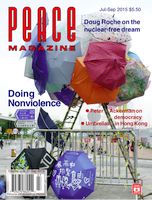
Peace Magazine Jul-Sep 2015, page 28. Some rights reserved.
Search for other articles by Rozali Telbis here
Not long ago, the world experienced a deep divide: the barbaric East vs. the civilized West. The fear of communism was called the “Red Scare.” The fear of the “Other” was paralyzing yet mobilizing. Many were paralyzed for fear of the repercussions of associating with the Other—the communist enemy.
While this climate of fear subsided following the Cold War, it has since been reinvented, creating a cold climate of suspicion. But today, the fear of the Other is so entrenched within our daily lives that we have become disconnected from each other.
Many are willing to compromise their basic freedoms for expanded security measures that create a fearful citizenry. The Charlie Hebdo attacks, the Copenhagen shooting, and the Boston bombings prove that increased security does not prevent terrorist attacks. In all three cases, the authorities were aware of the attackers prior to the massacres. There is no evidence that draconian surveillance measures have prevented acts of terror, yet this argument is still being used.
The latest compromise of privacy is Canada’s Bill C-51, also known as the Anti-Terror Bill, outlining security measures that grant CSIS expanded powers to identify and prevent suspected terrorist plots. CSIS previously had the power to amass and analyze information, but this new law gives CSIS the authority to intervene in thwarting terrorism wherever it sees fit.
The categorization of “terrorist” may incriminate environmentalists, social justice activists, and concerned citizens alike. It can create a chilling effect and self-censorship. The legislative measures are overreaching—much like the United States’ Patriot Act.
Meanwhile, in the United States there are calls to defend freedom of speech, yet these same people support the very leaders who punish others who speak their mind. The Charlie Hebdo attacks were seen as an attack on freedom of speech, yet the persecution of Saudi Arabian blogger Raif Badawi goes largely unreported. Badawi was guilty of several charges, including insulting the Islamic religion on his blog. The sentencing includes a 10-year prison sentence and 1,000 lashes, which are done publicly. Meanwhile, President Obama, Prime Minister David Cameron, and other world leaders publicly offered their sympathies after the death of King Abdullah of Saudi Arabia. The beheadings by ISIS have shaken the world, yet in Saudi Arabia, public beheadings and floggings remain common.
In 2013, a recorded minimum of 79 executions were carried out through public beheading or firing squad, according to Amnesty International. Among the revolting practices in Saudi Arabia, in August 5, 2014 Mohammaed bin Bakr al-Alawi was beheaded for allegedly practicing sorcery. Despite these atrocities, Saudi Arabia continues to be supported by the United States, which wages war on other “barbaric” states such as Iraq and Afghanistan. The US turns a blind eye to Saudi human rights violations. Saudia Arabia was home to 15 of the 19 terrorists responsible for the 9/11 attacks, yet the United States turned to Iraq, invading it on false pretenses and lies.
The American criminal justice system is anything but just or lawful. Mentally and physically handicapped prisoners are executed despite the Supreme Court’s decision that mentally handicapped individuals cannot be executed, as they do not know right from wrong. Despite the Supreme Court decision, these executions continue to take place without much criticism or repercussion.
Execution through lethal injection is becoming more common in the US. It has been adopted to mask the brutality of executions by disguising them as innocent and serene. Executions are brutal and savage. Lethal injection cannot mask the fact that people are being put to death for crimes they may or may not have committed. We condemn beheadings, perhaps because we can see the blood and the gore, yet many turn a blind eye to other injustices. Capital punishment in itself is a barbaric practice.
This hypocrisy extends into the military as well, where there is a marked difference between those considered heroes and traitors. The notion of the Other has seeped into Hollywood blockbuster movies. A recent piece of military propaganda, American Sniper, is based on the life of the late American Navy Seal sniper Chris Kyle. Kyle’s reported 160 kills in Iraq was the highest count ever in US military history.
Kyle was xenophobic. He referred to all Iraqis as “savages” and “evil” in his memoir, adding that he wished he killed more while he was on tour. He was a devoted Christian sniper who blindly followed orders and saw his kills as revenge for the 9/11 attacks. Now he is lauded as a hero in the national consciousness. Texas has declared February 2 “Chris Kyle Day,” two years after his death.
He has been rewarded for killing Iraqis—people who were not responsible for the 9/11 attacks. In the mainstream media, the sense of Other has mobilized soldiers to kill what they don’t understand—to provide a quick solution to a complex issue. Kyle is applauded while US drone strikes continue to kill innocent people in Yemen, Somalia, and Pakistan.
The hypocrisy doesn’t end there. The Islamic State (ISIL) is labeled as barbaric and uncivilized because of their atrocious execution methods. Yet Abu Ghraib was simply a case of a few “bad apples”—American soldiers who tortured innocent Iraqis on a daily basis. Abu Ghraib was portrayed as an isolated incident—but the recently released torture report proves that methods such as waterboarding were used to interrogate suspected terrorists under President George W. Bush. The threat of terrorism has replaced the fear of communism, and this enables more propaganda to enter the national consciousness.
Rozali Telbis is a writer, academic, and activist living in Vancouver.

Peace Magazine Jul-Sep 2015, page 28. Some rights reserved.
Search for other articles by Rozali Telbis here